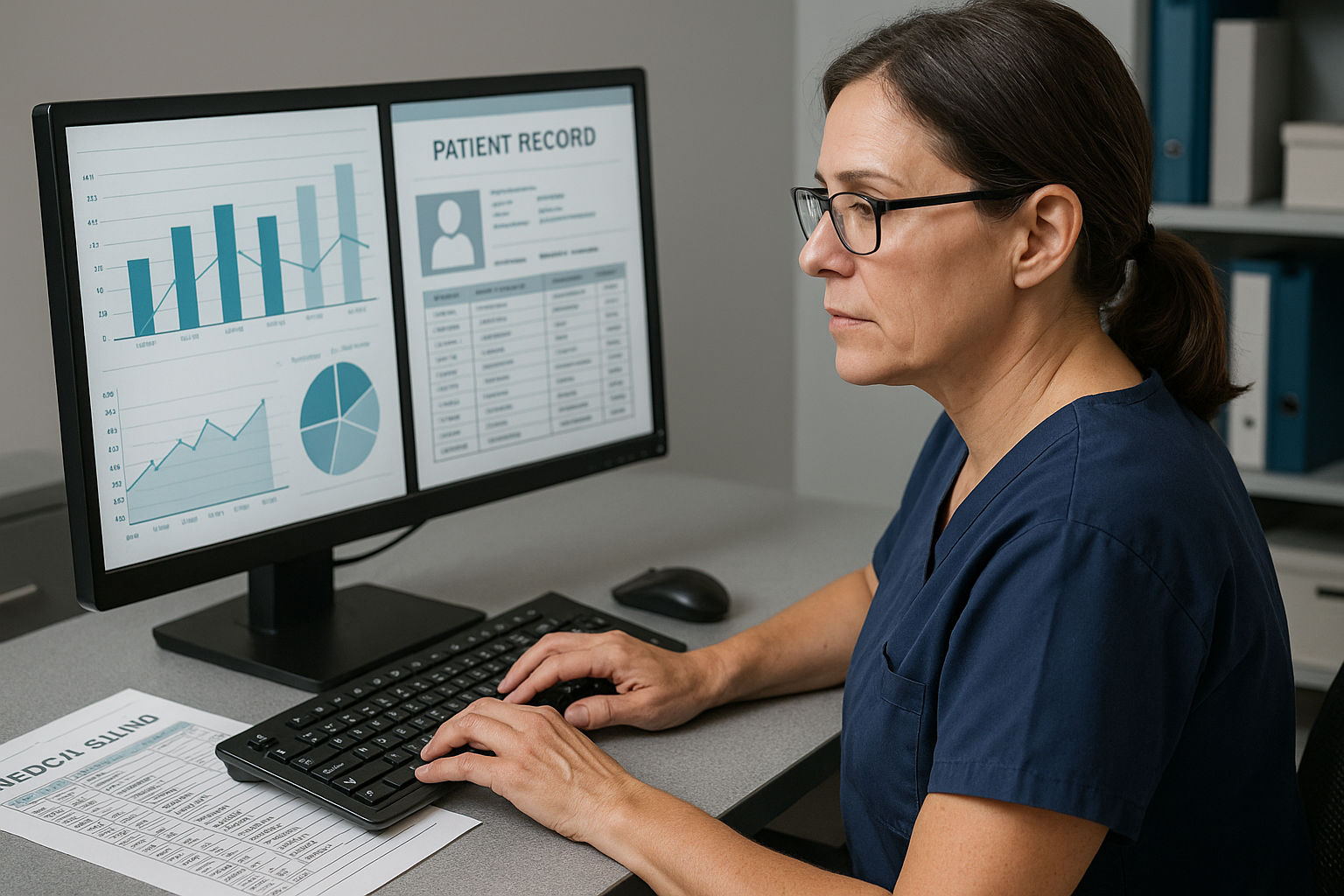
Top Benefits of Hiring a Virtual Health Assistant for Medical billing
Virtual Health Assistants for medical biling:
What is a Virtual Health Assistant?
A digital fitness assistant is a educated expert who gives remote assist to healthcare carriers. Think of them like a further pair of arms operating online handling administrative obligations, handling patient interactions, or even supporting in clinical billing. These virtual assistants don’t take a seat to your sanatorium however paintings from their own workplace the use of at ease internet tools.
In the arena of healthcare time is the whole thing. Doctors and nurses are frequently overwhelmed, not just by means of patients but additionally by using the heavy paperwork and scheduling chaos. That’s where a digital fitness care assistant turns into a game changer. They cope with the behind the curtain paintings so clinical professionals can focus more on patient care as opposed to office work.
The role of digital fitness assistants is becoming more not unusual, specially with the rise of far flung work and virtual fitness. Whether you are jogging a small personal health facility or a multi-distinctiveness health center, a virtual assistant can come to be an essential a part of your group without the price and effort of hiring complete time inhouse workforce.
They can paintings component-time or full-time, and that they can be specialized in health care which means they already realize a way to deal with tasks like coverage verification, affected person facts access, and following HIPAA pointers. In short they make a doctor’s day a lot smoother
Why Healthcare is Moving Towards Virtual Solutions
The healthcare world is evolving fast. With the growth of telemedicine the call for for digital solutions is at an all-time high. More and more clinics are figuring out the advantages of switching to digital and far flung systems. Virtual fitness assistants are a part of this revolution.
Virtual assistants are not simply cost-powerful they are also efficient. They lessen the need for physical space, device and extra in office workforce. Plus they may be bendy and scalable. You can rent them all through busy times and reduce hours when matters are slow.
Many medical practices are the usage of virtual assistants to assist with nonclinical duties. This enables lessen workforce burnout and will increase patient delight since the group can deliver extra attention to direct care in preference to office work. Healthcare is transferring forward and virtual assistants are gambling a key role in that journey.
Core Functions of a Virtual Health Care Assistant
Handling patient appointments can be a headache. Patients call in cancel reschedule and every so often don’t display up. Managing all this takes time and if something goes wrong it messes up the entire day's workflow.
A virtual fitness care assistant can take over this project. They use cloud-based totally scheduling systems to manipulate appointments easily. Whether it’s sending reminders to patients or confirming their availability they keep the entirety prepared.
They also can lessen no-suggests through sending well timed reminders through electronic mail textual content or name. Plus they’re available to manage schedule conflicts and remaining minute changes. It’s like having a digital receptionist who in no way takes a day without work.
By outsourcing appointment management to a digital assistant, scientific team of workers can keep hours every day. It ensures the the front desk is not overwhelmed and patients get higher provider and interest
Patient Record Management
Managing patient information is critical however permit’s be honest it’s also time-eating. A digital fitness assistant can replace, organize, and hold digital clinical facts (EMRs). They make certain all patient information is entered efficaciously and saved securely.
Having clean and updated patient records approach fewer mistakes higher choice-making and quicker carrier. Your clinic will become greater efficient and patient believe increases whilst things are treated professionally.
These assistants are skilled to handle sensitive records whilst following HIPAA hints. So you don’t want to fear about privacy troubles or compliance. It’s a reliable manner to keep your information sorted with out placing extra stress to your in-house team.
Insurance Verification and Claims Support
One of the biggest time-wasters for clinics is dealing with insurance. Verifying patient insurance submitting claims and following up on denial it's all complicated and frustrating. But not for a trained virtual assistant for health professionals.
These assistants know how to deal with insurance companies. They verify coverage before appointments handle paperwork and ensure claims are submitted on time. This speeds up the reimbursement process and reduces claim denials.
With their help, medical practices can stop losing money due to billing errors or missed claims. They also communicate with patients about what’s covered and what’s not, improving transparency and trust.
Why Health Practitioners Need Virtual Assistants
Time-Saving Benefits
Ask any medical doctor or health facility body of workers what they want they'd extra of, and the solution will in all likelihood be time. Health practitioners are constantly quick on it. That’s in which a virtual assistant for fitness practitioners steps in. These experts take through the years-consuming responsibilities that do not necessarily require medical expertise like answering phones dealing with affected person intake forms updating EMRs or handling coverage calls.
When you delegate these non-scientific duties to a virtual assistant, you loose up hours for your day. That time can be spent seeing extra patients enhancing care nice or maybe simply taking a far-wished wreck to avoid burnout. Virtual fitness care assistants act as a productiveness booster with out being physically gift within the hospital.
They're additionally extremely beneficial at some point of top seasons, like flu season or publish-holiday rushes. Instead of scrambling for brief help, you may assume your virtual assistant to address the accelerated workload smoothly. The end result ;; A happier body of workers, a greater prepared sanatorium, and higher patient experiences.
Focus on Patient Care
Every health professional gets into this field to help people not to deal with administrative overload. But the reality is that paperwork, scheduling, and billing often eat up more time than patient care itself.
That’s why many doctors and clinics are hiring virtual assistants for health professionals to help them get back to what really matters: the patient. With the backend tasks taken care of, healthcare providers can give their full attention to each patient without worrying about missed calls or data entry waiting in the background.
This shift in focus not only improves the quality of care but also boosts patient satisfaction. People feel more valued when their doctor isn’t rushing through appointments just to catch up on paperwork later. It's a small change with a big impact.
Virtual Assistants for Health Professionals: A Growing Trend
Increasing Demand in Telemedicine
Telemedicine has exploded in popularity over the past few years and with that, the need for virtual support has grown too. Doctors offering video consultations can’t do everything themselves. They need someone to schedule appointments set up calls collect patient data and follow up after consultations.
That’s where virtual health assistants shine. They are already working online, so they fit naturally into a telemedicine model. They can also handle technical issues guide patients through logging into the system and ensure everything runs smoothly.
More and more telehealth services are including virtual assistants as part of their standard setup. It helps doctors stay focused during remote consultations while keeping everything else in order behind the scenes.
Supporting Solo and Group Practices
Whether you're running a solo clinic or a larger group practice, hiring a virtual assistant can make a massive difference. For solo practitioners it means not having to juggle phone calls while checking a patient’s vitals. For group practices it means distributing administrative workload efficiently among multiple team members without hiring more full time staff.
A health care virtual assistant can be customized to your specific needs. Need someone who only handles billing? Done. Want someone to handle all patient communications? No problem. Their flexibility makes them ideal for practices of any size.
Plus, since they work remotely, there's no need to provide office space, equipment, or benefits. You get high-quality support at a fraction of the cost of a full-time in-house employee.
Key Benefits of Hiring a Health Care Virtual Assistant
Cost-Effective Staffing Solution
Hiring staff is expensive. There’s salary insurance training workspace equipment the list goes on. But when you hire a virtual health care assistant you skip most of those costs.
You only pay for the hours they work. There’s no need for office supplies computers or even physical space. Many virtual assistants come pre trained in healthcare systems and medical billing so you don’t have to spend time or money on onboarding.
This is especially helpful for small or growing clinics that can’t afford a big front-office team yet. You still get all the help you need without blowing your budget. It’s one of the smartest ways to expand your team without expanding your expenses.
24/7 Availability and Support
Need help after hours? Want someone to confirm appointments on weekends? A virtual assistant can do that. Unlike in-office staff who work set hours many virtual assistants offer 24/7 availability.
This is a huge advantage for clinics that operate in different time zones or have patients with odd schedules. It also allows for continuous patient engagement even outside regular hours. Follow ups prescription refills or general queries can be handled without delay.
You can even hire virtual assistants in different parts of the world to make sure there’s always someone online when your patients need support. That kind of around-the-clock care builds trust and loyalty with your patients.
Reduced Burnout for Medical Teams
Burnout in healthcare is real and it’s rising fast. Many doctors and nurses feel overwhelmed not just by their core responsibilities but by the flood of admin work that comes with the job.
Virtual assistants lighten that load. They take care of the repetitive time-draining tasks so the in-house team can breathe. This doesn’t just improve productivity it improves morale.
When your medical staff feels supported they perform better. They’re less likely to quit, more likely to stay engaged and more able to provide excellent care. It’s a win win for everyone.
Choosing the Right Virtual Assistant for Your Medical Practice
What to Look for in a Virtual Health Assistant
Hiring a virtual assistant isn’t just about finding someone who can type fast or answer calls. Especially in the medical field, the stakes are much higher. You want a virtual health assistant who understands medical terminology, privacy laws, and the high-pressure environment of healthcare.
Start by checking their background. Do they have experience working with medical professionals? Have they handled tasks like insurance verification, EMR updating, or patient communication before? Look for someone who has worked in medical billing or appointment coordination.
Soft skills matter too. You want someone who is organized, detail-oriented, and responsive. A healthcare environment is fast-paced—your virtual assistant needs to keep up. Also strong communication skills are a must. They’ll often interact with patients so being polite clear and helpful is essential.
Finally, check for tech-savviness. They should be comfortable with scheduling tools, EMR systems HIPAA compliant platforms, and secure communication tools. Hiring someone who already knows the ropes saves you valuable training time.
Essential Skills and Experience
So what specific skills should you look for in a virtual assistant for health practitioners? Here are some essentials:
-
Knowledge of medical billing and coding
-
Familiarity with HIPAA regulations
-
Experience with EMR/EHR software
-
Proficiency in calendar and email management
-
Strong written and spoken communication
-
Ability to handle confidential data securely
If your practice has a particular focus like pediatrics, dermatology, or mental health—you might also want someone with experience in that specialty. A good match will understand your patient base, your workflow, and your tools.
Virtual Assistants in Medical Billing
How They Help with Medical Coding and Billing
Medical billing is one of the most tedious parts of running a clinic. It’s also one of the most important. A mistake in a billing code or delay in claim submission can cost your practice money. That’s why many clinics now turn to a health care virtual assistant who specializes in billing.
These virtual professionals are trained in medical coding, CPT codes ICD-10 codes and insurance protocols. They prepare and submit insurance claims, follow up on pending payments, and make sure that billing is done accurately and on time.
They also communicate with insurance companies to resolve issues correct denials and track payments. With them handling the financial side your clinic’s revenue flow becomes more predictable and efficient.
Hiring a virtual assistant for billing helps reduce rejected claims and ensures that your team gets paid faster. It's like having your own personal revenue cycle manager but remote and more affordable.
Reducing Errors and Delays in Payments
One small error in a medical claim like a wrong code or missing detailcan delay payment for weeks. These delays hurt cash flow and stress out your staff. That’s why accurate billing is so critical.
A trained virtual health care assistant ensures that everything is double-checked before submission. They follow up with patients and insurers, correct errors quickly and resubmit claims without waiting for in-house staff to find time for it.
They also maintain detailed billing records so you can track every dollar. With fewer errors and faster follow-ups your practice gets paid faster and loses less revenue to claim rejections.
Real-Life Success Stories
Clinics That Transformed Their Workflow
Don’t just take our word for many clinics have seen real improvements after hiring a virtual assistant for health professionals. For example, a solo practitioner in California was spending up to 15 hours a week on admin tasks. After hiring a virtual assistant she cut that time in half and increased her patient load by 30 percent
Another multi-specialty clinic in Texas hired two virtual assistants to handle billing and patient communication. In just three months, their average claim processing time dropped by 40%, and their patient no-show rate dropped by 20%—all thanks to timely reminders sent by their VAs.
These are just a few examples, but the message is clear: virtual assistants don’t just save time—they help clinics grow, reduce overhead, and improve patient satisfaction.
Security and Compliance
HIPAA Compliance and Data Protection
When it comes to healthcare, nothing is more important than patient privacy. That’s why any virtual health assistant you hire must be fully trained in HIPAA compliance.
They should know how to handle sensitive information, use secure communication platforms, and avoid sharing private data inappropriately. Look for assistants who are HIPAA-certified or have undergone specific training in data protection.
You’ll also want to make sure your systems are secure—encrypted communication, strong passwords, and access controls are a must. Some clinics also use third-party tools that limit what virtual assistants can see or access, adding another layer of security.
When done right, working with a virtual assistant can be just as secure as working with someone in-house—sometimes even more secure because virtual professionals are often trained with stricter data protocols.
Ensuring Patient Privacy
Patients trust you with their most personal information. That trust should extend to anyone on your team, including remote workers. That’s why privacy isn’t just a legal requirement—it’s a moral one.
Before hiring, ask your virtual assistant for health practitioners how they protect data. Do they use password managers? Do they avoid public Wi-Fi? Do they follow double-verification protocols?
Most professional virtual assistants already have these systems in place. Still, it’s good to do your due diligence. Conduct background checks, sign NDAs, and use secure portals for data sharing. When both sides are committed to privacy, you create a safe and trustworthy healthcare environment.
Common Misconceptions About Virtual Assistants
Are They Reliable?
One of the most common fears about hiring a virtual health assistant is whether they’re truly reliable. After all, they’re not sitting in your office, and you can’t watch them work—so how do you know they’re doing the job?
The truth is, professional virtual assistants are often more reliable than in-office staff. Why? Because their business depends on your satisfaction. Most virtual assistants work under contracts, and their income relies on maintaining quality service and strong relationships.
Many use time-tracking tools, performance dashboards, and detailed task updates. You’ll always know what’s being done and when. Plus, you can set performance expectations and review progress weekly or monthly. It’s all about communication and clear structure.
So yes—they’re not just reliable. They’re also motivated, self-managed, and performance-focused. You get dependable support without the overhead.
Can They Replace On-Site Staff?
Another myth? That virtual assistants will take over and replace in-office employees. That’s not the case at all. A virtual assistant for health professionals is there to support your team—not replace them.
They handle repetitive or time-consuming tasks like data entry, scheduling, billing, and insurance follow-ups—freeing your in-house team to focus on what they do best: patient care, diagnostics, and treatments.
In fact, many clinics report that their on-site staff performs better when supported by virtual help. Everyone gets to work more efficiently without feeling overwhelmed. It’s teamwork—just a little more digital.
Integrating Virtual Assistants Into Your Workflow
Tools and Platforms Used
You might be wondering: how do you even start working with a virtual health assistant? The answer lies in using the right tools. These platforms make collaboration seamless, even across time zones.
-
Project Management Tools
Trello, Asana, ClickUp
-
Communication Tools
Slack Microsoft Teams Zoom
-
Document Sharing
Google Workspace Dropbox OneDrive
-
Healthcare Platforms
Kareo eClinicalWorks Athenahealth
-
Scheduling Tools
Calendly Acuity Scheduling
-
Secure Messaging
Spruce OhMD TigerConnect
With these tools, your virtual assistant can stay in sync with your clinic in real time. You can assign tasks, set reminders, monitor progress, and even track hours worked.
Integration takes a few days to set up, but once everything is in place, it runs like a well-oiled machine.
Training and Onboarding
Even if a health care virtual assistant comes with experience, some training is still essential—especially if your practice uses specific tools or follows unique protocols.
Start with a clear onboarding process. Introduce your clinic's workflow, preferred platforms, daily routines, and common tasks. Walk them through how you handle patient files, schedule appointments, and manage billing.
Use screen recordings or step-by-step guides. Set up a test week with smaller tasks. Check in frequently in the first month to answer questions and give feedback.
Once they’re up to speed, most virtual assistants become completely independent—and extremely effective. The short investment in onboarding pays off big time.
Challenges and How to Overcome Them
Communication Barriers
Working remotely comes with its own set of challenges, and communication is one of the biggest. What if you and your virtual assistant are in different time zones? What if something gets lost in translation?
Here’s how to keep communication clear and easy:
-
Set overlapping work hours
-
Use daily or weekly check-ins
-
Share task lists and deadlines
-
Encourage quick updates via chat tools
-
Use video calls for detailed discussions
Being proactive prevents misunderstandings. When communication flows well, everything else does too.
Managing Remote Staff
Managing remote workers can feel unfamiliar at first. You can’t just walk over and ask for a status update. That’s why systems are crucial.
Use tools that offer task tracking and time logs. Ask for daily progress reports. Set goals for the week. Give constructive feedback. Most importantly treat your virtual assistant for health practitioners as part of the team.
When you build trust and give them responsibility they’ll rise to the challenge. Remote doesn’t mean distant it just means digital.
The Future of Virtual Health Care Assistants
AI and Automation in Healthcare
The future of healthcare is digital and virtual health care assistants are leading the charge. As AI tools like natural language processing and machine learning become more advanced assistants will be able to take on even more.
We’re already seeing AI powered scheduling chatbots for patient questions and automated medical billing systems. In the near future your virtual assistant may use AI to analyze patient trends flag missing data or optimize workflows.
But don’t worryAI is not replacing human assistants. It’s making them more powerful. The combination of human intelligence and smart automation is the next big step for medical practices.
What’s Next for Virtual Support?
Expect to see more specialized virtual assistants ones trained in cardiology dermatology psychiatry and more. Expect better integration between healthcare systems and virtual staff. And expect a shift where having a virtual assistant for health professionals isn’t just a luxury it's the standard.
If your clinic hasn’t made the move yet now’s the time. The future is flexible efficient and virtual.
Conclusion
Virtual health assistants are not just a trend they're a transformation in the way healthcare is delivered. They save time cut costs and reduce stress. They improve patient care boost staff morale, and streamline every part of your practice. Whether you're handling scheduling, billing, or managing patient records a virtual assistant can make your clinic more efficient and effective.
With the right person the right tools and the right training you can turn your overloaded practice into a smooth patient-focused and future-ready operation.
Don’t wait to join the digital healthcare revolution. Embrace the benefits of hiring a virtual health care assistant and experience the difference in your day to day workflow.
Final Thoughts on Embracing Virtual Support in Healthcare
In today's fast-paced healthcare environment, providers are expected to juggle everything from patient care to endless administrative duties. That’s just not sustainable. But with the help of a virtual health assistant things become manageable efficient and cost-effective.
Whether you're running a small clinic or a growing group practice adding a virtual health care assistant to your team can dramatically transform your workflow. They're skilled affordable and flexible enough to handle everything from appointment scheduling to insurance followups.
This isn't just about convenience it's about survival in a competitive healthcare landscape. When you hire a health care virtual assistant, you're investing in smoother operations better patient service, and a more balanced work environment for your team.
More and more professionals are discovering the benefits of using virtual assistants for health practitioners and virtual assistants for health professionals. This trend is growing because it works. It lets clinics focus on care while the admin runs on autopilot.
So, if you've been thinking about hiring a virtual assistant this is your sign. The future of healthcare is here and it's digital remote and efficient.
FAQs
What is the role of a virtual health assistant in a medical clinic?
A virtual health assistant supports medical professionals remotely by managing tasks like appointment scheduling, patient record updates, insurance verification and even medical billing. They’re like an off site admin pro helping your practice run smoothly.
How does a virtual health care assistant help with medical billing?
A virtual health care assistant can handle everything from insurance claims submission and coding to payment follow ups. They ensure that the billing cycle flows without delays or costly errors.
Are virtual assistants for health practitioners only useful for large practices?
Not at all! Even solo practitioners benefit from hiring virtual assistants for health practitioners. They can work part-time, full-time, or per task, making them ideal for practices of all sizes.
What's the difference between virtual assistants for health professionals and general VAs?
Virtual assistants for health professionals are specifically trained in healthcare workflows. They understand medical terms HIPAA rules and EMR systems unlike general VAs who might not have healthcare experience.
5. Is it safe to hire a health care virtual assistant for handling sensitive patient data?
Yes, as long as you hire a certified and experienced assistant. A health care virtual assistant should follow HIPAA regulations and use secure tools to ensure patient data is always protected.





